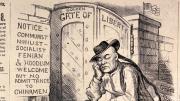Harvard College today offered regular admission to 1,220 applicants to the class of 2027; combined with the 722 early-action applicants granted admission in December, 1,942 of the 56,937 applicants to the class (3.4 percent) were granted admission. The applicant pool declined 4,283 (7 percent) from the 61,220 who sought places in the class of 2026 (perhaps partly reflecting a return to normalcy following a surge in post-pandemic applications in the prior year).
• Financial aid. The College also boosted the Harvard Financial Aid Initiative. Beginning with this entering class, attending Harvard will be free for children of families with incomes below $85,000: their tuition, housing, food, and fees will be waived, and each eligible student will also receive a $2,000 transition grant to help with move-in and other expenses. This income level for no-cost attendance is a $10,000 increase over the prior $75,000 threshold. Significantly, however, Harvard did not match peers Princeton (which is fully endowed for financial aid, as Harvard’s Faculty of Arts and Sciences is not) and Stanford, both of which have raised their no-cost family-income threshold to $100,000 for the entering class—up from $65,000 and $75,000, respectively. At all three institutions, roughly one-quarter of undergraduates come from families under the new income thresholds. According to the College announcement today, “roughly 55 percent of students will receive need-based grants, allowing aided families to pay an average of $13,000 annually” (including those who attend free of cost).
Harvard’s term bill—tuition, room, board, and fees—will increase 3.5 percent, to $79,450 (up $2,687 from the current $76,763). The rate of increase is well below the general rate of inflation and the fiscal year 2022 Higher Education Price Index rate of 5.2 percent (presumably higher for the current fiscal year)—but the increase in the 2023-2024 College term bill is up from 3.0 percent in the prior year. (Stanford raised its term bill a whopping 7 percent, offsetting the impact for students receiving financial aid with the change in the family-income threshold and other enhancements.)
• Class characteristics. According to the announcement, 19 percent of accepted applicants qualified for federal Pell grants, awarded to students from lower-income background. Nearly one-fifth of those admitted are first-generation college students. Both proportions are slightly below those reported for those admitted to the class of 2026.
The admitted cohort is, as always, geographically far-flung, representing all 50 states, the District of Columbia, Puerto Rico, and 101 countries beyond the United States. Some 14.5 percent are international students.
By other measures of diversity, according to the announcement, among those admitted to the class of 2027, 15.3 percent identify as African American/Black, 29.9 percent as Asian American, 11.3 percent as Latinx, 2.2 percent as Native American, and 0.5 percent as Native Hawaiian. Women are 53.6 percent of those accepted. Those figures largely parallel the prior-year profile, with Asian Americans accounting for a slightly higher proportion of those admitted, and African American and Latinx students a slightly lower proportion—all directionally consistent with the class of 2026 admissions data.
Prospective students can kick the tires in person during Visitas, April 23-24, or virtually through Crimson Connect. They have until the end of the day on Monday, May 1, to reply to the College’s offer of admission.









